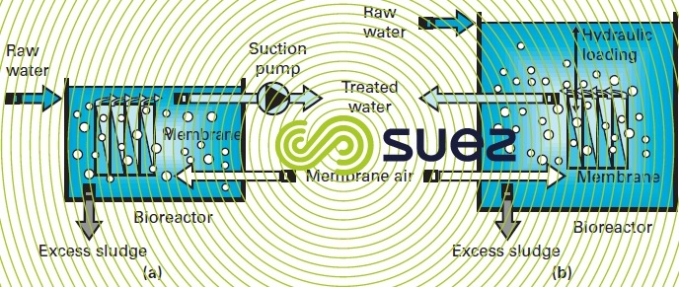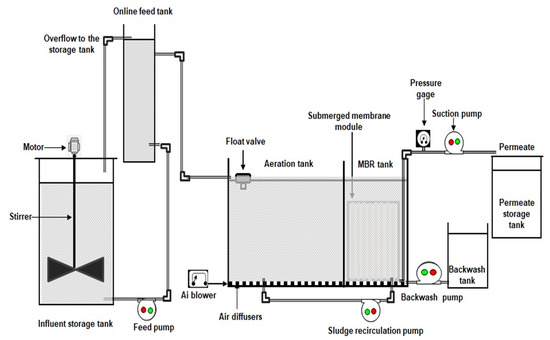How Membrane Bioreactor Technology Is Revolutionizing Wastewater Treatment
How Membrane Bioreactor Technology Is Revolutionizing Wastewater Treatment
Blog Article
How Membrane Layer Bioreactors Are Transforming Water Filtration Solutions
The introduction of membrane layer bioreactors (MBRs) represents a substantial development in the area of water purification, merging biological treatment procedures with sophisticated membrane purification technologies. This combination not just improves the top quality of treated effluent yet also addresses metropolitan room constraints, making MBRs specifically suitable for densely inhabited areas. As international water scarcity escalates, the role of MBRs in assisting in potable water reuse and sustainable water management ends up being significantly vital. Yet, the effects of this technology prolong past performance-- what chances and difficulties exist ahead for its extensive application?
Introduction of Membrane Bioreactors
Membrane bioreactors (MBRs) stand for a considerable improvement in water purification technology, as they combine biological therapy procedures with membrane layer purification. This integration improves the performance of wastewater therapy by making use of microorganisms to deteriorate organic contaminants while simultaneously employing semi-permeable membrane layers to separate treated water from suspended solids and virus.
The MBR system typically consists of a biological activator where the microbial populace metabolizes impurities, complied with by a membrane filtering unit that keeps biomass and enables only tidy water to pass through. This double performance leads to higher effluent high quality contrasted to standard therapy methods. MBRs can be operated in both set and constant flow settings, using versatility in style and application.
They additionally make it possible for the healing of water for reuse, therefore adding to water sustainability efforts. In general, MBRs are at the forefront of enhancing water treatment performance and quality, showcasing the potential for ingenious solutions in ecological management.
Advantages of MBR Modern Technology
The combination of organic treatment with membrane layer filtration provides numerous benefits for water filtration processes. Among the primary advantages of Membrane Bioreactor (MBR) modern technology is its ability to effectively eliminate both organic and inorganic contaminants, causing premium effluent. The membrane layers work as a physical obstacle, stopping suspended solids and microorganisms from passing through, which boosts the general safety and integrity of cured water.
Furthermore, MBR systems need a smaller impact compared to standard treatment approaches, enabling more efficient room utilization. This portable layout is specifically helpful in urban settings where land is limited. MBRs also demonstrate operational flexibility, fitting varying influent qualities and flow prices without significant efficiency deterioration.
Additionally, the procedure uses enhanced nutrient removal abilities, especially for nitrogen and phosphorus, which are crucial for preventing eutrophication in getting waters. The minimized sludge manufacturing related to MBR modern technology likewise translates to lower disposal prices, making it a cost-effective option over time - Membrane Bioreactor. On the whole, the advantages of MBR modern technology setting it as a leading selection for cutting-edge and sustainable water filtration systems, dealing with both environmental and financial issues
Applications in Water Filtration
Applications of Membrane Bioreactor (MBR) technology in water purification are impactful and varied, resolving various treatment requires across multiple fields. MBRs successfully combine organic therapy processes with membrane layer filtration, making them suitable for local wastewater therapy, industrial effluent management, and also potable water reuse initiatives.
In local setups, MBRs are progressively used to boost the top quality of treated wastewater, permitting for conformity with rigorous discharge policies and helping with the recycling of water for watering and non-potable uses. Their small layout also makes them appropriate for city environments where space is limited.
Industrially, MBR modern technology is utilized to treat procedure water and wastewater, particularly in industries such as food and beverage, drugs, and textiles. By effectively removing impurities and suspended solids, MBRs help read the article industries minimize ecological influences while recovering beneficial resources from wastewater streams.
Additionally, MBRs are acquiring traction in decentralized water treatment applications, where small-scale systems can be try these out released in remote areas or developing areas. This flexibility enables areas to achieve sustainable water management options, enhancing accessibility to clean water while decreasing reliance on traditional therapy methods.
Instance Studies and Success Stories

In an additional example, a textile production facility in Bangladesh adopted MBR innovation to address its wastewater obstacles. The system reduced chemical oxygen need (COD) degrees from 1,200 mg/L to less than 100 mg/L, therefore satisfying regulatory requirements and substantially lessening ecological impact.
The University of Cape Town's MBR setup has confirmed efficient in treating greywater for non-potable reuse on school. This project not only preserves potable water yet likewise works as an academic version for lasting techniques.
Furthermore, a fish and shellfish processing plant in Norway used MBR modern technology to deal with effluents including high levels of raw material, achieving over 90% pollutant elimination. These case researches emphasize MBR technology's versatility and its vital function in enhancing water high quality throughout varied applications.
Future of Water Therapy Solutions
As global water shortage and pollution difficulties escalate, ingenious water therapy solutions are coming to be progressively necessary to make sure sustainable accessibility to clean water. The future of water my review here therapy depends on the assimilation of innovative technologies that enhance the effectiveness and effectiveness of purification processes. Membrane layer bioreactors (MBRs) go to the leading edge of this advancement, combining biological treatment with membrane layer purification to create high-grade effluent ideal for numerous applications.

Emerging patterns such as source healing from wastewater, including nutrients and energy, will certainly even more change therapy facilities into eco-friendly centers. Developments in nanotechnology and membrane materials assure enhanced efficiency and longevity of purification systems.

Verdict
Finally, membrane bioreactors stand for a considerable development in water purification modern technologies, effectively integrating biological treatment with sophisticated membrane layer filtration. The many benefits, consisting of improved effluent top quality and minimized spatial requirements, make MBRs particularly appropriate for urban applications. Their function in potable water reuse and sustainable water monitoring highlights their significance in resolving global water deficiency difficulties. Proceeded r & d will further enhance the efficacy and adoption of MBR modern technology, ensuring a resistant future for water therapy solutions.
The development of membrane bioreactors (MBRs) stands for a significant innovation in the area of water filtration, merging biological therapy processes with sophisticated membrane filtration modern technologies. As international water shortage escalates, the duty of MBRs in promoting potable water reuse and sustainable water management comes to be significantly important. They also enable the recovery of water for reuse, therefore adding to water sustainability initiatives.As worldwide water scarcity and pollution obstacles escalate, ingenious water therapy services are ending up being progressively vital to guarantee sustainable access to tidy water. Their role in potable water reuse and sustainable water administration highlights their importance in resolving worldwide water deficiency challenges.
Report this page